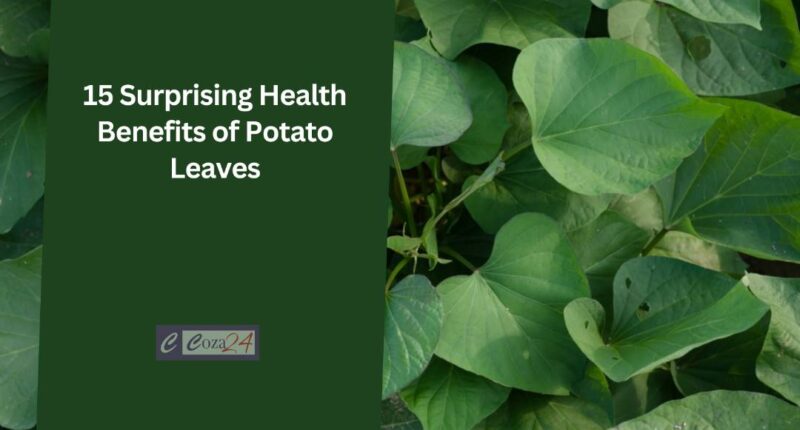Potatoes are widely known for their starchy tubers, but did you know that the leaves of the potato plant also offer a myriad of health benefits?
Potato leaves, also known as potato greens, are the leafy greens that grow on top of the potato plant. They are often overlooked and discarded, but they are actually a nutritional powerhouse packed with vitamins, minerals, and antioxidants.
In this article, we will explore 15 surprising health benefits of potato leaves that will make you think twice before throwing them away.
Table of Contents
- 1 1. Rich in Vitamins
- 2 2. High in Antioxidants
- 3 3. Supports Digestive Health
- 4 4. Boosts Immunity
- 5 5. Promotes Heart Health
- 6 6. Supports Weight Loss
- 7 7. Enhances Bone Health
- 8 8. Supports Eye Health
- 9 9. Boosts Brain Function
- 10 10. Regulates Blood Sugar Levels
- 11 11. Anti-Inflammatory Properties
- 12 12. Supports Skin Health
- 13 13. Provides Detoxification Support
- 14 14. Reduces Inflammation
- 15 15. Supports Overall Well-Being
- 16 FAQs
- 17 Conclusion
1. Rich in Vitamins
Potato leaves are a great source of vitamins, particularly vitamin C and vitamin K. Vitamin C is known for its immune-boosting properties and its ability to fight off harmful free radicals. On the other hand, vitamin K plays a crucial role in blood clotting and bone health. By including potato leaves in your diet, you can ensure that your body receives an ample amount of these essential vitamins.
2. High in Antioxidants
Antioxidants are compounds that help protect the body against oxidative stress and damage caused by free radicals. Potato leaves contain a variety of antioxidants, such as flavonoids and carotenoids, which have been linked to a reduced risk of chronic diseases, including heart disease and certain types of cancer. Including potato leaves in your meals can provide an antioxidant boost to support your overall health.
3. Supports Digestive Health
Potato leaves are a good source of dietary fiber, which plays a crucial role in maintaining a healthy digestive system. Fiber adds bulk to the stool, promotes regular bowel movements, and helps prevent constipation. By incorporating potato leaves into your diet, you can support a healthy digestive tract and improve overall gut health.
4. Boosts Immunity
As mentioned earlier, potato leaves are rich in vitamin C, which is well-known for its immune-boosting properties. Vitamin C helps stimulate the production of white blood cells, which are essential for fighting off infections and diseases. By consuming potato leaves, you can strengthen your immune system and enhance your body’s ability to ward off illnesses.
5. Promotes Heart Health
Potato leaves contain potassium, a mineral that plays a vital role in maintaining heart health. Potassium helps regulate blood pressure by counteracting the effects of sodium. By including potato leaves in your diet, you can support healthy blood pressure levels and reduce the risk of cardiovascular diseases.
6. Supports Weight Loss
If you’re trying to shed a few pounds, potato leaves can be a valuable addition to your diet. These greens are low in calories and high in fiber, which can help you feel full and satisfied without consuming excessive calories. Additionally, the fiber in potato leaves promotes healthy digestion and can aid in weight management.
7. Enhances Bone Health
Potato leaves are a good source of vitamin K, which is essential for maintaining strong and healthy bones. Vitamin K helps activate proteins that are involved in bone mineralization and supports the overall bone density. Regular consumption of potato leaves can contribute to improved bone health and reduce the risk of osteoporosis.
8. Supports Eye Health
Potato leaves contain a group of antioxidants called carotenoids, including lutein and zeaxanthin, which are beneficial for eye health. These antioxidants help filter harmful blue light and protect the eyes from damage caused by oxidative stress. Including potato leaves in your diet can help maintain good vision and reduce the risk of age-related eye diseases.
9. Boosts Brain Function
The antioxidants found in potato leaves also have positive effects on brain health. They help reduce inflammation and oxidative stress in the brain, which can contribute to improved cognitive function and a lower risk of neurodegenerative diseases, such as Alzheimer’s disease. Adding potato leaves to your meals may support brain health and enhance cognitive abilities.
10. Regulates Blood Sugar Levels
Potato leaves contain compounds that have been shown to have anti-diabetic properties. They may help regulate blood sugar levels by improving insulin sensitivity and reducing insulin resistance. Including potato leaves in your diet, along with a balanced meal plan, can contribute to better blood sugar control.
11. Anti-Inflammatory Properties
Inflammation is a natural response by the body to protect against injury and infection. However, chronic inflammation can contribute to the development of various diseases. Potato leaves possess anti-inflammatory properties that can help reduce inflammation in the body and support overall health.
12. Supports Skin Health
Potato leaves have been used for centuries in traditional medicine to promote healthy skin. They are rich in vitamins and antioxidants that help nourish the skin, improve its elasticity, and protect it from damage caused by environmental factors. Applying potato leaf extract or incorporating potato leaves into your diet can contribute to healthier and more radiant skin.
13. Provides Detoxification Support
The antioxidants and fiber present in potato leaves can aid in the detoxification process. They help eliminate toxins from the body and support the function of the liver and kidneys, which are the primary organs responsible for detoxification. Including potato leaves in your diet can help cleanse your body and promote overall detoxification.
14. Reduces Inflammation
Potato leaves contain certain compounds that have been found to have anti-inflammatory properties. These compounds can help reduce inflammation in the body, which is often associated with chronic diseases such as arthritis, asthma, and inflammatory bowel disease. Adding potato leaves to your meals may help alleviate inflammation and improve related symptoms.
15. Supports Overall Well-Being
By now, it’s clear that potato leaves offer a wide range of health benefits. From supporting heart health to boosting brain function and promoting healthy digestion, incorporating potato leaves into your diet can contribute to your overall well-being. These versatile greens can be enjoyed in various recipes, such as salads, stir-fries, and smoothies, allowing you to reap their nutritional benefits in delicious and creative ways.
Next Post | Zendaya is the center of love triangle with Josh O’Connor and Mike Faist in new Challengers trailer
FAQs
1. Are potato leaves safe to eat?
Yes, potato leaves are safe to eat, provided they are properly cooked or prepared. Raw potato leaves may contain certain compounds that are toxic and can cause digestive issues. Cooking the leaves thoroughly eliminates these concerns, making them safe and nutritious to consume.
2. Can I eat potato leaves raw?
It is generally recommended to cook potato leaves before consuming them. Cooking helps break down the tough fibers and reduces the risk of any potential toxicity. However, if you prefer to eat them raw, it is advisable to consume them in moderation and ensure they are fresh and free from any pesticides or chemicals.
3. How can I incorporate potato leaves into my diet?
There are several ways to incorporate potato leaves into your diet. You can add them to salads for an extra nutritional boost, include them in stir-fries, or blend them into smoothies. You can also sauté potato leaves with other vegetables or use them as a substitute for spinach or other leafy greens in recipes.
4. Where can I buy potato leaves?
Potato leaves can be found at farmers’ markets, specialty grocery stores, or even grown in your own garden if you have potato plants. Make sure to choose fresh, vibrant leaves without any signs of wilting or damage.
5. Are potato leaves only beneficial for humans?
Potato leaves can provide health benefits for humans as well as certain animals. For example, some livestock animals, such as cows and goats, can graze on potato leaves as part of their diet. However, it’s essential to consult with a veterinarian or animal nutritionist before feeding potato leaves to animals.
6. Can potato leaves be stored for later use?
Potato leaves are best consumed fresh for maximum nutritional value. However, if you have an excess amount, you can store them in the refrigerator. Place the leaves in a plastic bag or airtight container and store them in the vegetable crisper. They should remain fresh for a few days, but it’s best to consume them as soon as possible.
Conclusion
Potato leaves are not just an overlooked part of the potato plant; they are a nutritional powerhouse with numerous health benefits. From supporting digestive health to boosting immunity and promoting heart health, these greens offer a wide range of advantages. By incorporating potato leaves into your diet, you can enjoy their surprising health benefits and enhance your overall well-being. So, don’t let those potato leaves go to waste anymore—start exploring creative ways to include them in your meals and unlock their incredible potential.











